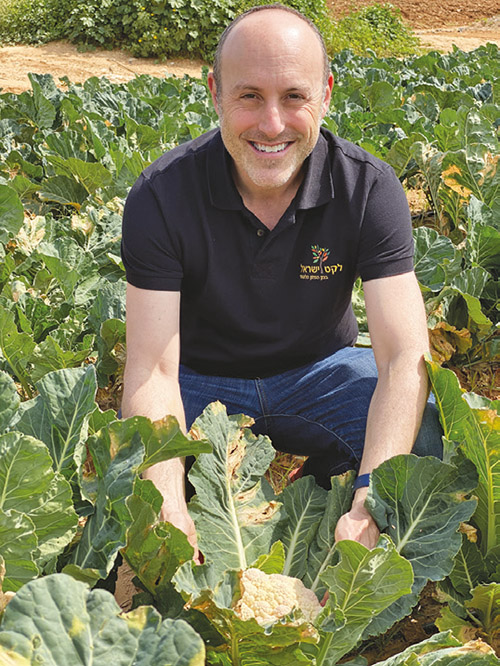
When Riverdale native Joseph Gitler made aliyah in 2000, he could not have imagined that 21 years later, he would bear the title of founder and chairman of Israel’s largest food rescue organization, feeding 246,000 hungry Israelis weekly. The path to establishing Leket for the lawyer-turned-social entrepreneur was certainly not the one he intended to take, but the journey has proven to be a very rewarding one.
This journey began at the height of the Intifada in 2003, when Gitler became keenly aware of the food inequalities in Israel. As a tourist, he was exposed to an affluent side of Israel, one that includes plentiful breakfasts and oversized portions at restaurants. It was only after he made aliyah that his eyes were opened to the reality of poverty in Israel, and particularly to the hunger.
“I could not believe that there was such a large poverty problem in a country that was getting richer by the day, yet the problem was getting worse,” Gitler said. “You saw the thriving restaurants and hotels, yet there was an underbelly of people who weren’t making enough money to survive in a country where the cost of living was going up.” The situation deeply troubled him, and he contemplated practical steps he could take to alleviate the growing food insecurity.
Gitler, who at the time was working as a software developer, began by visiting food distribution centers to get a sense of whether they were utilizing leftover food. Although there was interest in receiving excess food, the centers did not have the logistical capabilities or the resources to coordinate food pickup. Gitler reached out to local caterers and began driving late at night to gather leftover food and distribute it on his own to soup kitchens and other food distribution centers. In just a few weeks, he began recruiting volunteers to assist in his efforts. Shortly after, he purchased refrigerators to store larger amounts of food.
What started as a one-man undertaking turned into an operation that currently employs 120 staff and sees 50,000 volunteers annually. In addition to securing excess food from hotels, event halls, IDF bases and corporate cafeterias, Leket also works with farmers, packing houses and retailers to rescue and distribute damaged crops of lower market value, before they rot in the fields. The organization also lobbies the government for long-term reforms that address the root causes of hunger in Israel.
According to a report published by Leket in cooperation with Israel’s Ministry of Environmental Protection, 5.5 billion pounds of food were wasted in the country in 2019. With so much going to waste, it is shocking that during the same year, approximately 2.3 million Israelis—or 25% of the population—were living under the poverty line. The coronavirus pandemic has only led to increased food insecurity and has affected households that have not previously experienced poverty.
Gitler has met many individuals whose lives were turned upside down as a result of the pandemic. Natalya is an immigrant from Moldova who made a living as an opera singer. When the pandemic struck, she was left without work or money to feed her family. Today Natalya is able to survive thanks to the nutritious meals Leket provides her. “When I first saw food outside my door I cried, not just for the food, but also because it showed that while I had thought of myself as alone, I wasn’t, and that people cared,” Natalya shared. Gitler highlights this story as an example that food shortages can exist even in the most unexpected places.
While idealism led Gitler to take action, he is a realist when it comes to the future. He knows that it is nice to dream big, but poverty is around to stay. He is constantly implementing strategies to maximize the efficiency of Leket for the future. One project in the works is a partnership with a technology company that produces drones that can provide more accurate information about what crops are being grown and when, leading to a more efficient workflow with farmers. Gilter dreams of a day when no nutritious food will go to waste.
Looking back at his meaningful journey that began with late-night drives around the neighborhood, Gitler still cannot believe the direction his life took. “I am at the stage of life when I can say how fortunate I am that this is what I get to spend my time doing.” Indeed, so many individuals are reaping the fruits of his labor and can go to sleep feeling satiated, thanks to a man who had the vision and tenacity to tackle one of Israel’s greatest social challenges.
Alisa Bodner is a Fair Lawn native who immigrated to Israel a decade ago. She is a nonprofit management professional who enjoys writing in her free time!













